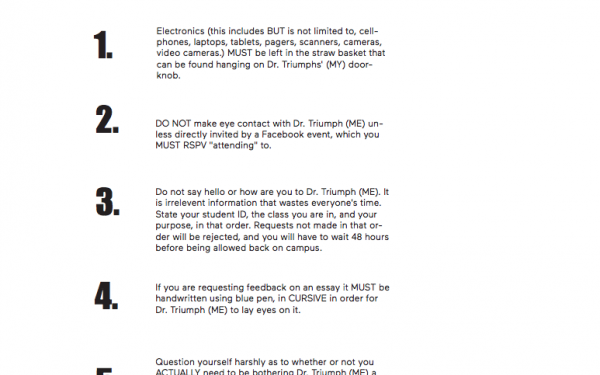Ten alternatives to “ladies and gentlemen”
PLEASE don’t say “theydees and gentlethems”
Below is a compilation of some of my favourite gender-neutral terms to address a crowd. Hopefully, this list will help you whenever you find yourself writing a work email or speaking to a group of people. 2022 is the year we stop saying “ladies and gentlemen.”
1. Friends and enemies (inspired by Malcom X)
2. Humans and non-humans
3. People/comrades/colleagues/peers/associates/partners (just one of these would suffice, but you may use the combination that fits best your speech)
4. Y’all (some might mistake you for a southwestern American, but yeehaw am I right?)
5. Fellas (or fellows if you don’t think fella is gender-neutral enough)
6. Folks (also spelled folx, a more inclusive term for marginalized identities)
7. [REDACTED] (Most insults are gender-neutral but The Link cannot condone this language)
8. Your highnesses
9. Distinguished guests
10. Prestigious/esteemed/honourable attendees (again, just one is enough, but if flattery is your forté, go wild)
Honourable mention: Guys, gals and non-binary pals—though this one makes gendered distinctions among guests and not everyone identifies as either a guy, a gal or a non-binary pal. Use this one sparingly, if at all.
Why are we still imposing binaries on crowds? It’s still misgendering even if you didn’t mean to. Saying “But I’ve always said ‘ladies and gentlemen,’” or “But I’m not misgendering anyone directly,” aren’t valid arguments because it’s just like breaking any other habit. If you’re so sure that you aren’t misgendering anyone, why don’t you ask someone who doesn’t identify as either a lady or a gentleman if they feel misgendered when you use that expression? It doesn’t cost you anything to simply find another expression to use.
Oh, and if you’re wondering, the expression “theydees and gentlethems” makes my skin crawl. After all, why are we gendering gender-neutral pronouns? It’s not only performative and cringeworthy, but it’s still misgendering because you are creating a new binary specifically for non-binary people… I will leave the room if I hear it.
This article originally appeared in The Body Issue, published February 1, 2022.



_1_600_375_90_s_c1.jpg)


